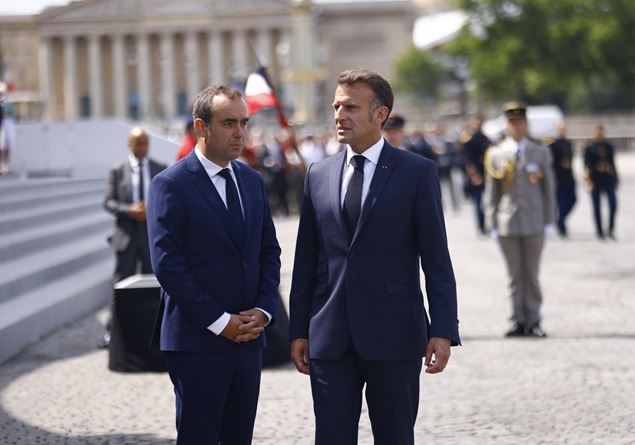Macron’s “solitary” walk (first on the right) along the Seine.
Appointed on the evening of Sunday 5 October and halving on the morning of the following day, just fourteen hours later – less than the life of a butterfly – that of Sébastien Lecornu is the shortest government in the history of France, having even beaten that of Frédéric François -Marsal in 1924 (which lasted two days). It is one of the extravagances of this democracy where everything is possible: that a former President of the Republic ends up in prison for corruption (Nicolas Sarkozy) while the current one remains at the Elysée with a very narrow consent – A Boiteux Canarda zoppa duck, writes Mondi – And they shout his resignation loudly, that the squares are filled with angry crowds with the cry of “Bloquons Tout”, we block everything (coincidentally slogan borrowed from our CGIL, which evidently liked it), that the public debt is all exploded by overtaking the Italian one, that the most avant -garde welfare of the world are asked for more dracon. Greece, that Parliament is divided into three watertight blocks, unable to communicate with each other to create a majority. C’est La Pagaillesay the French. A total chaos.
The current situation is the result of a concatenation of institutional imbalances. On the defendant’s counter, wrongly or reason, there is in fact the semi -depresses of the fifth republic, with the obsession of politicians for the presidential election, which has become the true center of gravity of power, the center of permanent gravity conceived by ton ton De Gaulle in 1958, who had sewn the new constitution to be measured, like a tailoring dress of size as strong as hers. In France, the head of state, elected directly by the people – unlike the Italian one – has enormous prerogatives, from the choice of the Prime Minister to the dissolution of the National Assembly. This “republican monarch”, as has been defined, decides foreign and defense policy, presides over the Council of Ministers, ratify the treaties, accredited the ambassadors, can even take full powers in the event of national crisis by temporarily suspending the separation of powers, such as the dictators of ancient Rome. The Prime Minister is practically a co -fingers of internal politics.
For this reason, in the fifth republic, consultations for the choice of the President of the Republic have always been considered the election queen “. The legislative, those that appoint the deputies of the national assembly, usually confirm the political structure. Usually, but not always. In 1981 the deputies supporters of François Mitterrand obtained the absolute majority; the same happened for Emmanuel Macron in 2017. After the re -elections: both in 1988 with Mitterrand, and in 2022 with Macron. Republican.
The problem is that the end of the historic bipolarization between the center -right and the center -left has redesigned a fragmented political landscape, with two new ascent actors that put the moderate in difficulty: the far left and the far right, both for a long time penalized by the majority system of the legislative. Even a simple “pact of non -distrust” was rejected by the socialist party, close between the electoral and ideological pressure of France Insoumise by Jean-Luc Mélenchon. Ditto with the right of Marine Le Pen, who awaits only his turn. The truth is that in France no one thinks more about the present: everyone looks to 2027, the next presidential elections. Until then, the country will remain suspended, as in apnea. Macron, in his lonely walk along the Seine yesterday afternoon, must have sensed him: the system is built on a single man, but the man is no longer there. And as long as the culture of the compromise – the one that in Italy and Germany allows coalitions to survive – will also not take over the national assembly, France will remain prisoner of its own idea of power: a country in search of a new “republican monarch” in the middle of chaos. But a year is still missing. What will happen in the meantime?


